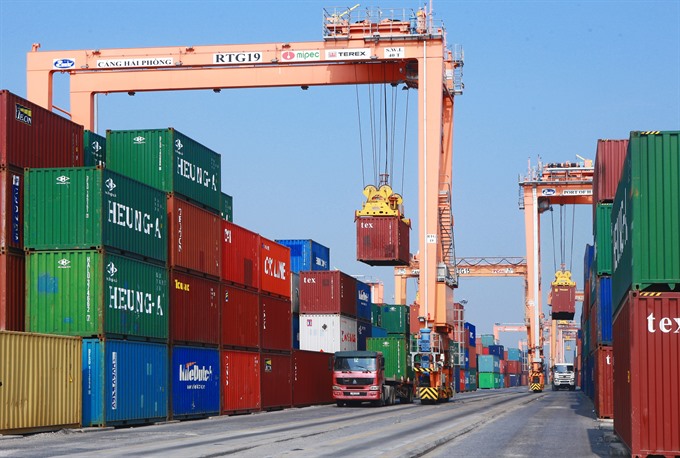 Economy
Economy

Despite facing challenges, Việt Nam has great opportunities to sustain its high economic growth rate, a seminar heard in HCM City yesterday.
 |
| Containers are being loaded at Hải Phòng Port. Potential investment opportunities are available for investors in areas such as infrastructure development, banking and tourism. — VNA/VNS Photo Lâm Khánh |
Xuân Hương
HCM CITY — Despite facing challenges, Việt Nam has great opportunities to sustain its high economic growth rate, a seminar heard in HCM City on Thursday.
Đinh La Thăng, Secretary of the City Party Committee told the Việt Nam Economic Scenario 2017- Business-Investment in a Changing World seminar that the global economy continues to be volatile and hard-to-predict with the rise of populism.
A slower than forecast recovery of the world economy, a reduction in global trade growth and a slowdown in the commodity market have adversely affected export-driven economies, including Việt Nam, he said.
The country also faces challenges at home, including complicated weather patterns and climate change as well as slow growth in labour productivity and enterprises’ capacity, he said.
“We should not be discouraged when looking at a somewhat gloomy general picture, but we accept the reality.
“Because our economy also has many golden opportunities to retain its high growth rates and even achieve a big breakthrough.”
He said the basis for his optimism include the Government’s programme to restructure the economy and renovate its growth model, its determination to act as a constructive, truthful Government to serve the people and consider the private sector an important driving force of the economy.
These have significantly supported enterprises’ development and motivated innovative start-up programmes, he said.
The desire to develop the agricultural sector using high-technology would help raise its competitiveness in the global market, he added.
Other delegates said since the end of last year the country’s economy has seen both advantages and difficulties.
The Government has implemented many measures to resolve the difficulties faced by companies, improve the business environment and support start-ups, they said.
These policies have yielded positive signs like investment by the private sector increasing by 9.4 per cent and the number of new businesses going up by 110,000 last year.
FDI flows reduced globally last year, but Việt Nam’s share increased by 9 per cent.
Economist Võ Trí Thành said despite facing difficulties in exports and attracting foreign investment, Việt Nam still has certain advantages, including geographic and political.
Furthermore, Việt Nam is not only a promising market of more than 90 million increasingly affluent people, but also a gateway for foreign investors and businesses to access markets that have free trade agreements with Việt Nam, he said.
Talking about promising sectors for investment, he listed processing, real estate, finance-banking, and even agriculture.
Don Lam, CEO and founding partner of VinaCapital, said “Beyond our traditional focus on companies participating in the domestic consumption story, we see potential investment opportunities in areas such as infrastructure and perhaps the banking sector, which are among the top priorities for the Government.
“Hospitality is another sector with great promise. Tourism numbers reached records in 2016 and are expected to continue to rise this year. At the same time, our tourism industry remains undeveloped compared with neighbours such as Thailand and Malaysia, so the prospect for growth is tremendous.”
Delegates said if Việt Nam wants to achieve economic growth of 6 per cent or more this year, its economic policies must be steady and flexible and restructuring has to be speeded up, especially that of the banking and financial systems and State-owned enterprises.
Thành said “Việt Nam needs to provide a new impetus for reforms as well as ‘quality resources’ for development. The interaction between domestic reforms and integration become much more important.”
Nguyễn Tú Anh, deputy head of the State Bank of Việt Nam’s Monetary Policy Department, said the central bank would track economic and monetary developments to adopt appropriate monetary policy tools to balance inflation and economic growth.
It would meanwhile make efforts to keep the monetary and foreign exchange markets stable, he assured.
Thăng said HCM City leaders understand the challenges and are determined to overcome them to retain the city’s position as the country’s leading economy and aim for higher targets.
The city is implementing seven breakthrough programmes based on its strengths and potential, and attaches great importance to reforming the investment environment, motivating entrepreneurs and creating conditions for establishing and developing businesses, he said.
The seminar, organised by the Vietnam Economic Times, was attended by more than 300 delegates, including Vietnamese and foreign business executives. — VNS




